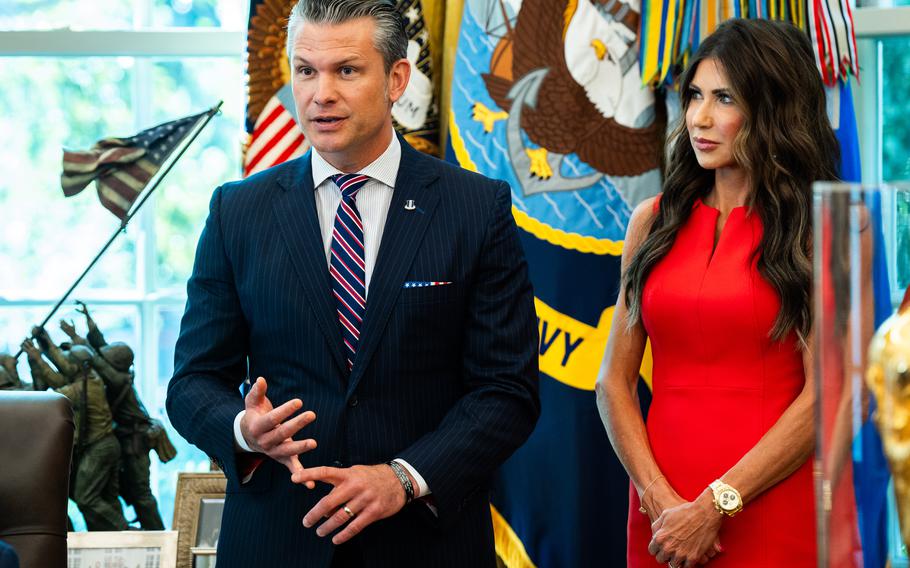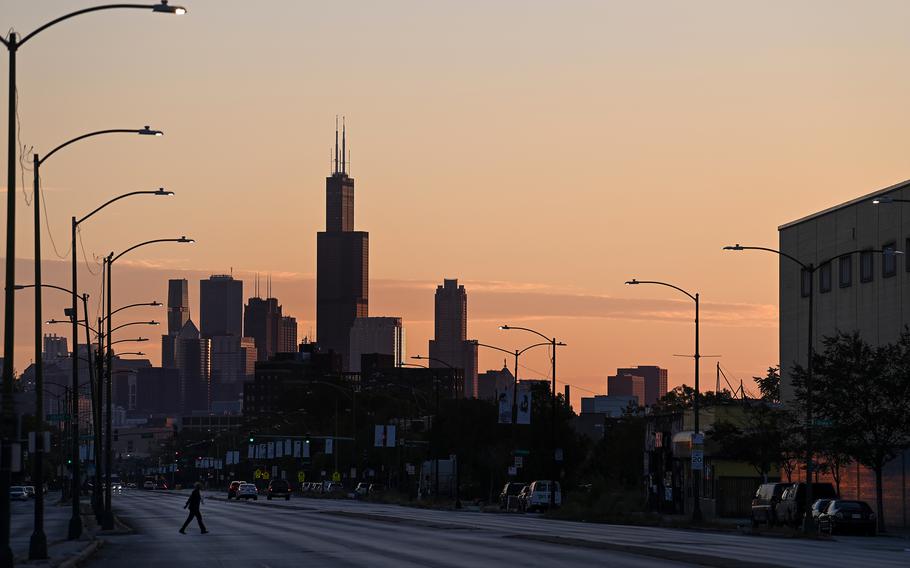
Defense Secretary Pete Hegseth and Homeland Security Secretary Kristi L. Noem in the Oval Office earlier this week. (Demetrius Freeman/The Washington Post)
The Trump administration wants to use a Navy base north of Chicago as a launchpad for federal law enforcement activity against undocumented immigration, defense officials said Tuesday, as the White House contemplates also deploying thousands of U.S. troops to the nation’s third-largest city amid rising tension with the Illinois governor.
Officials at Naval Station Great Lakes on Wednesday acknowledged having received a request from the Department of Homeland Security that seeks “limited support” for Immigration and Customs Enforcement. The base, a hub for recruit training, would provide “facilities, infrastructure, and other logistical needs” if the request is granted, defense officials said in a statement.
No decisions to approve access have been made, officials said. That responsibility lies with Defense Secretary Pete Hegseth, who since taking office in January has eagerly pledged the Pentagon’s full cooperation as DHS and its agents search for, detain and remove undocumented immigrants. He has approved the use of other military bases to build detention facilities for people in DHS custody.
The White House is determined to ramp up ICE operations, with Deputy Chief of Staff Stephen Miller pressing for 3,000 arrests per day.
Asked about its plans for the Navy base in Illinois, DHS tied the discussion to Trump’s call for safer cities, though the vast majority of those targeted for removal have no history of violent crime. Homeland Security Secretary Kristi L. Noem said in an interview with NewsNation this week that DHS will have an “ICE strike team” in Chicago soon.
“Across the country, DHS law enforcement are arresting and removing the worst of worst including gang members, murderers, pedophiles, and rapists that have terrorized American communities,” the agency said in a statement.
Spokespeople for Hegseth referred questions to DHS.

Naval Station Great Lakes near Chicago would provide “facilities, infrastructure, and other logistical needs” if the request is granted, defense officials said. (Joshua Lott/The Washington Post)
The request for use of Naval Station Great Lakes was reported earlier by the Chicago Sun-Times, which cited an email the base’s commanding officer, Navy Capt. Stephen Yargosz, sent to staff. Yargosz said in the message that DHS authorities would be at the Navy base from Sept. 2 to 30, with a “potential to also support National Guard units.”
The Washington Post reported Saturday that military officials have for many weeks been devising plans to send U.S. troops to Chicago, likely coordinated with expanded ICE operations there. A range of options exist, with one likely plan calling for a few thousand members of the National Guard to deploy, officials familiar with the matter said. The deployment of active-duty troops has also been considered, officials said.
The backlash from state and local officials has been fierce. Gov. JB Pritzker (D) has said that while Chicago has some challenges, there are no circumstances that warrant the deployment of military force there.
Pritzker told reporters Wednesday that no one from the White House or elsewhere in the federal government had contacted him about the matter.
“They don’t seem to want to communicate at all. And that’s odd because it sounds like what they’re trying to do is march right over local police,” Pritzker said of the Trump administration. “You know, we used to hear that the president of the United States supported local police. We support local police. But now it appears that he wants to ignore them all together and just do whatever he has a whim about on that day.”
Pritzker and Trump have traded jabs in recent days, with Trump saying he wants the governor to approve a military deployment. But the president suggested, too, that he may send the military even if Pritzker does not endorse the move. Trump, speaking Tuesday, claimed he has “the right to do anything that I want to do.”
“I’m the president of the United States,” he said. “If I think our country is in danger - and it is in danger in these cities - I can do it.”
Experts on constitutional law questioned the legal limits of what Trump can approve, while acknowledging that he may pursue another domestic military deployment anyway and let the courts sort it out later.
Elizabeth Goitein, senior director of the Brennan Center’s Liberty and National Security Program, said that for Trump to deploy the Illinois National Guard in Chicago without Pritzker’s consent, he could rely on the same legal authority laid out in Title 10 of U.S. code to send troops to Los Angeles earlier this year.
In that case, the administration cited a section of law that says that U.S. troops are allowed to deploy within the United States with a limited role when “there is a rebellion or a danger of a rebellion against the authority of the Government” or when the president is unable to “execute the laws of the United States.” Administration officials cited a handful of protesters throwing concrete at ICE agents as the legal basis for the deployment.
Whether the administration met the legal bar for the deployment in California remains contested, with a trial held earlier this month in U.S. District Court and no ruling issued yet by Judge Charles Breyer.
But even if that deployment is deemed to have been lawful, the situation in Chicago is separate and there is no indication of a rebellion there, Goiten said. Violent street crime also cannot be used as a legal basis to send in U.S. troops, she said.
“The administration,” she said, “will be on even thinner legal ice in Chicago than they are in Los Angeles.” Marianne LeVine contributed to this report.